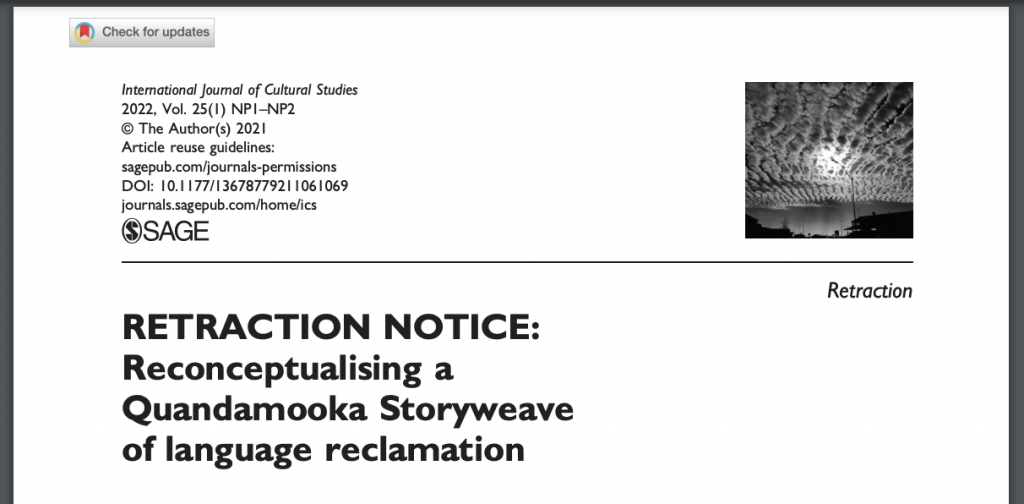
Talk about cultural misappropriation.
A cultural studies journal has retracted a 2021 article on storytelling among the Quandamooka people in Australia for widespread plagiarism.
The article, “Reconceptualising a Quandamooka Storyweave of language reclamation,” appeared in the International Journal of Cultural Studies in July and was written by a group led by Sandra Delaney, a scholar of indigenous languages in Australia.
As the journal, a Sage title, makes clear, the article went through the typical course of peer review and, presumably, some editing – which somehow managed to miss plagiarised text from not one but at least eight sources. Three of those involved rip-offs from unpublished university theses, while the rest were from published articles.
According to the retraction notice:
At the request of the Journal Editors, the following article has been retracted:
Delaney S, Casali GL, Huijser H (2021) Reconceptualising a Quandamooka Storyweave of language reclamation, first published July 2021 https://doi.org/https://doi.org/10.1177/13678779211030282.
This article went through double blind review and received approving reviews. However, upon publication online, the editors were contacted by authors whose work had been copied:
Chew KA (2016) Chikashshanompa’ Ilanompohqli Biyyi’ka’chi [We Will Always Speak the Chickasaw Language]: Considering the Vitality and Efficacy of Chickasaw Language Reclamation, Unpublished PhD thesis, University of Arizona, USA.
Leonard WY (2017) Producing language reclamation by decolonising ‘language’. Language Documentation and Description 14: 15–36.
Leonard WY (2018) Reflections on (de)colonialism in language documentation. In: McDonnell B, Berez-Kroeker AL and Holton G (eds) Reflections on Language Documentation 20 Years after Himmelmann 1998. Language Documentation and Conservation Special Publication 15. Honolulu: University of Hawai’i Press, pp. 55–65.
After further investigation, further instances of plagiarism were detected, including copying from the following:
Brown HJ, McPherson G, Peterson R, Newman V and Cranmer B (2012) Our land, our language: Connecting dispossession and health equity in an Indigenous context. Canadian Journal of Nursing Research 44(2): 44–63.
Sium A and Ritskes E (2013) Speaking truth to power: Indigenous storytelling as an act of living resistance. Decolonisation: Indigeneity, Education & Society 2(1): I–X.
Thompson J (2012) Hedekeyeh Hots’ih K!hidi – Our Ancestors Are in Us: Strengthening Our Voices through Language Revitalisation from a Tahltan Worldview. Unpublished PhD thesis, University of Victoria, Canada.
Twance M (2019) Learning from land and water: Exploring mazinaaabikiniganan as indigenous epistemology. Environmental Education Research 25(9): 1319–1333.
Young AE (2015) Indigenous Elders Pedagogy for Land-based Health Education Programs: Gee- zhee-kan’dug Cedar Pathways. Unpublished PhD thesis, University of British Columbia, Canada.
Delaney did not respond to a request for comment.
Kari Chew, one of the researchers whose thesis the authors plagiarized, a member of the Chickasaw Nation, and a faculty member who studies indigenous education at the University of Oklahoma, told us that she learned about the misappropriated text last July:
We alerted the journal in August 2021. The journal placed the responsibility on us to provide evidence of the plagiarism. The journal then conducted its own investigation. Sage then became involved. The plagiarism is more extensive than stated in the retraction. Additional sources and authors who are not named in the retraction were also plagiarized.
Like Retraction Watch? You can make a one-time tax-deductible contribution by PayPal or by Square, or a monthly tax-deductible donation by Paypal to support our work, follow us on Twitter, like us on Facebook, add us to your RSS reader, or subscribe to our daily digest. If you find a retraction that’s not in our database, you can let us know here. For comments or feedback, email us at [email protected].
If you look at plagarism as a form of colonialism/exploitation (and you can if you’re willing to be a bit deliberately obtuse), this is one of the most ironic cases of plagarism ever.
Why didn’t any of the journalists comment that president Joe biden was nailed for plagiarism and reprimanded. I pray that those who judge such piggybacking would write a paper on the disintegration of ethics, morals and professional accountability. Sad that no one mentioned bidens moral deficiencies.
Plagiarism is a western word, in Australian Aboriginal culture everything is shared and are all equal. Without understanding the background of the people who produced the paper, I will reserve my judgement on them. Surely if they understood the protocols of published works, they would already know it was not acceptable.
“in Australian Aboriginal culture everything is shared”
This is a strong claim to make about Aboriginal culture(s). I am going to have to ask for a citation.
A lot of indigenous Australians feel strongly about cultural appropriation and colonial theft of intellectual property.
In principle “everything was shared” but only after ongoing negotiation, respect and integrity. Taking and using anyone else’s publications is the same as taking their story and telling it as it is your own. That’s not about respect, its about skewed morals, bad scholarship and sad attitudes (re. I can take your story and turn it into my own and I don’t have to be accountable for that). That it was retracted is good thing and such a relief, but too much of this types of plagiarism happens (yes, even by ‘insiders’ who make claims its a cultural practice – when it’s not). Most of this immoral and illegal actions (yes, both from Aboriginal moral systems) and it isn’t uncovered and then if it is uncovered – it’s re-covered (i.e., not addressed). It’s the proverbial iceberg.